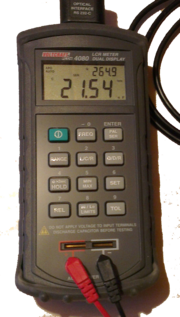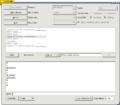Difference between revisions of "Voltcraft 4080"
(mention 39 char serial frames) |
Uwe Hermann (talk | contribs) |
||
| Line 9: | Line 9: | ||
| measurements = resistance, capacitance, inductance | | measurements = resistance, capacitance, inductance | ||
| features = autorange, relative, auto-poweroff, min-max, tolerance | | features = autorange, relative, auto-poweroff, min-max, tolerance | ||
| website = [http://www.conrad.com/ce/en/product/121064/VOLTCRAFT-LCR-4080-Digital-Multimeter-DMM-20000-digits | | website = [http://www.conrad.com/ce/en/product/121064/VOLTCRAFT-LCR-4080-Digital-Multimeter-DMM-20000-digits conrad.com] | ||
}} | }} | ||
The ''Voltcraft | The '''Voltcraft 4080''' is an LCR meter with USB connectivity. | ||
The ''PeakTech 2165'' appears to be another rebrand. | The '''PeakTech 2165''' appears to be another rebrand. It is described as 4.5 digits (20000 count) LCR meter with 0.5% basic accuracy (resistance) that can measure at 120Hz and 1kHz, and comes with USB connectivity (serial protocol). | ||
== Photos == | |||
<gallery> | |||
File:Voltcraft4080_complete.jpg|<small>Device, top</small> | |||
File:Voltcraft4080_cutecom.png|<small>Terminal session</small> | |||
</gallery> | |||
== Protocol == | == Protocol == | ||
Serial communication runs at 1200 7e1, uses ASCII characters and is basically human readable. You can access the device with e.g. a terminal program like ''CuteCom''. | Serial communication runs at 1200/7e1, uses ASCII characters and is basically human readable. You can access the device with e.g. a terminal program like ''CuteCom''. | ||
Serial packets consist of 39 ASCII characters that end in the CR-LF termination, contain a lot of single character flags, as well as multiple multi-character fields for the primary and secondary displays. | Serial packets consist of 39 ASCII characters that end in the CR-LF termination, contain a lot of single character flags, as well as multiple multi-character fields for the primary and secondary displays. | ||
| Line 25: | Line 32: | ||
When the device does not respond it might be in setup mode. You can see that in the display. But the software can not. So it might be a good idea to do an initialization with [BXXXXXX] to stop the setup mode. This only works for a setup mode that was requested by an earlier remote session. You can not leave a manual setup mode this way. | When the device does not respond it might be in setup mode. You can see that in the display. But the software can not. So it might be a good idea to do an initialization with [BXXXXXX] to stop the setup mode. This only works for a setup mode that was requested by an earlier remote session. You can not leave a manual setup mode this way. | ||
Some findings not mentioned in the protocol definition above; without waranty: | Some findings not mentioned in the protocol definition above; without waranty: | ||
=== Disabling keys === | === Disabling keys === | ||
Sending | Sending | ||
<small> | |||
A | A | ||
</small> | |||
responds with | responds with | ||
<small> | |||
REMOTE READY.. | REMOTE READY.. | ||
and says '''RS232''' in the display | </small> | ||
and says '''RS232''' in the display. | |||
Keys on device are disabled | Keys on device are disabled. | ||
=== Enabling keys === | === Enabling keys === | ||
Sending | Sending | ||
<small> | |||
B | B | ||
</small> | |||
responds with | responds with | ||
<small> | |||
REMOTE STOP... | REMOTE STOP... | ||
Keys on device are enabled | </small> | ||
Keys on device are enabled. | |||
=== Resources === | === Resources === | ||
* [http://www.conrad.com/ce/en/product/121064/VOLTCRAFT-LCR-4080-Digital-Multimeter-DMM-20000-digits Voltcraft 4080 product page at Conrad] | * [http://www.conrad.com/ce/en/product/121064/VOLTCRAFT-LCR-4080-Digital-Multimeter-DMM-20000-digits Voltcraft 4080 product page at Conrad] | ||
* [http://www.produktinfo.conrad.com/datenblaetter/100000-124999/121064-da-01-en-Schnittstellenbeschr_LCR_4080_Handmessg.pdf | * [http://www.produktinfo.conrad.com/datenblaetter/100000-124999/121064-da-01-en-Schnittstellenbeschr_LCR_4080_Handmessg.pdf Protocol summary at Conrad] | ||
* [http://peaktech.de/productdetail/kategorie/lcr-messer/produkt/p-2165.html PeakTech 2165 product page] | * [http://peaktech.de/productdetail/kategorie/lcr-messer/produkt/p-2165.html PeakTech 2165 product page] | ||
* [http://peaktech.de/productdetail/kategorie/lcr-messer/produkt/p-2165.html?file=tl_files/downloads/2001%20-%203000/PeakTech_2165_USB.pdf PeakTech user manual] bilingual (German/English), see chapter 7 for the protocol | * [http://peaktech.de/productdetail/kategorie/lcr-messer/produkt/p-2165.html?file=tl_files/downloads/2001%20-%203000/PeakTech_2165_USB.pdf PeakTech user manual] bilingual (German/English), see chapter 7 for the protocol | ||
Revision as of 17:23, 18 June 2017
 | |
| Status | planned |
|---|---|
| Source code | serial-lcr |
| Counts | 20000 |
| IEC 61010-1 | — |
| Connectivity | USB, RS232 |
| Measurements | resistance, capacitance, inductance |
| Features | autorange, relative, auto-poweroff, min-max, tolerance |
| Website | conrad.com |
The Voltcraft 4080 is an LCR meter with USB connectivity.
The PeakTech 2165 appears to be another rebrand. It is described as 4.5 digits (20000 count) LCR meter with 0.5% basic accuracy (resistance) that can measure at 120Hz and 1kHz, and comes with USB connectivity (serial protocol).
Photos
Protocol
Serial communication runs at 1200/7e1, uses ASCII characters and is basically human readable. You can access the device with e.g. a terminal program like CuteCom.
Serial packets consist of 39 ASCII characters that end in the CR-LF termination, contain a lot of single character flags, as well as multiple multi-character fields for the primary and secondary displays.
The description of the commands you find at Conrad. The PeakTech 2165 user manual has another description, represented differently.
When the device does not respond it might be in setup mode. You can see that in the display. But the software can not. So it might be a good idea to do an initialization with [BXXXXXX] to stop the setup mode. This only works for a setup mode that was requested by an earlier remote session. You can not leave a manual setup mode this way.
Some findings not mentioned in the protocol definition above; without waranty:
Disabling keys
Sending
A
responds with
REMOTE READY..
and says RS232 in the display.
Keys on device are disabled.
Enabling keys
Sending
B
responds with
REMOTE STOP...
Keys on device are enabled.
Resources
- Voltcraft 4080 product page at Conrad
- Protocol summary at Conrad
- PeakTech 2165 product page
- PeakTech user manual bilingual (German/English), see chapter 7 for the protocol

